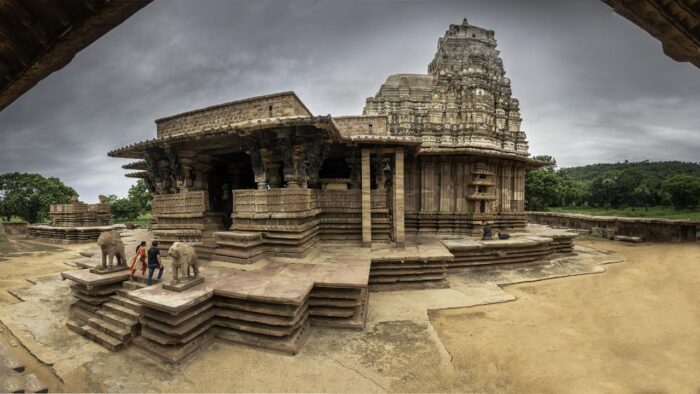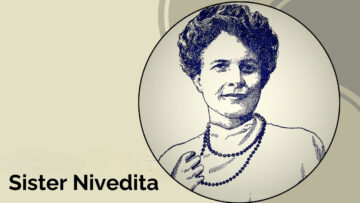Introduction:
मैत्रीम् भजत अखिलहृज्जेत्रीम्, आत्मवदेव परानपि पश्यत। युद्धं त्यजत स्पर्धां त्यजत, त्यजत परेषु अक्रमम् क्रमणम् ॥ जननी पृथिवी कामदुघास्ते, जनको देवः सकलदयाळु:। दाम्यत दत्त दयध्वं जनताः श्रेयो भूयात् सकलजनानाम् ॥
maitrīṃ bhajata akhilahṛjjetrīm, ātmavadeva parānapi paśyata | yuddhaṃ tyajata spardhāṃ tyajata, tyajata pareṣu akramam ākramaṇam || jananī pṛthivī kāmadughā(ā)ste, janako devaḥ sakaladayāluḥ | dāmyata datta dayadhvaṃ janatāḥ śreyo bhūyāt sakalajanānām ||
Cultivate friendship that will conquer the hearts of everyone : Look upon others as yourself : Reject war and forsake (unhealthy) competition : Avoid aggression on others by force : All we need is provided by mother earth God, our father, is all kindness Practice kindness and give (charity) : May all people prosper
This powerful, peaceful and persuasive poem was composed by His Holiness Jagadguru Shri Chandrasekharendra Saraswati , head of the Kanchi monastery (equivalent to the Pope) for the special occasion of the United Nations Day on October 23, 1966. This was set into a song and performed in a concert event on that special day by the famous vocalist M.S. Subblakshmi. Enjoy the song performed recently by 47 Indian musicians by clicking below.
https://www.youtube.com/watch?v=KL_3uWDz5eI
So on that day the representatives from the whole world heard that song and gave a standing ovation and a thunderous applause, and went home and appeared to have forgotten all about it! That was about 60 years ago. Read that translation again – and again. Every year since then, as usual, men and women throughout the world have been worshipping at temples, churches, mosques and synagogues. It appears this most touching appeal to all the peoples of the world has made no difference as is now evident. Wars in Afghanistan, Iraq, Syria and Yemen are but a few examples of serious violation of the spirit embedded in the poem above. It is clear that the world pays no attention to the preaching of religious leaders or prescriptions from scriptures from our faiths. We seem to have lost the capacity to listen, contemplate and practice our beliefs.
Ironically and tragically the wretched tiny monstrous virus Covid is singing the same song!!
If after my talk you don’t pick up the phone and urge your loved ones and friends to love their neighbors and strive for peace and prosperity world-over, then I must conclude that I have failed.
It is not an exaggeration to say that the entire Hindu philosophy is summarized in this beautiful poem.
How did the Jagadguru offer this brilliant appeal and blessing to humanity? Because he was obviously the master of thousands of years old Hindu scriptures that moved him to view the world events and realize the ancient wisdoms buried in Hindu philosophy.
For example listen to this mandate from one of the scriptures:
अयम् निजह परोवेति गनना लघु छेतसाम्
उदार छर्तितानाम् तु वसिधैव कुतुम्बकम्
Mahopanishad: VI-71-73
ayam nijaha paroveti gananaa laghu chetasaam
udaara chartitaanaam tu vasidhaiva kutumbakam
This one is my relative, the other a stranger, say the narrow minded.
The entire world is a family, say the magnanimous.
Imagine the price humanity has paid recently by ignoring this fundamental wisdom of the ancients. The much simpler “Love Thy Neighbor” that you all know is its equivalent. At this writing, over 4.5 million deaths around the world have occurred in about a year, with over 600,000 preventable deaths in the U.S. alone due to a monstrous virus so small it cannot be seen by naked eyes but only through a high-powered microscope (the human hair is about a thousand times larger than the size of the virus). It has devastated the world giving an unusual power to each of us, no matter who we are: a prince or a pauper, someone who lives in a mansion or someone who is homeless; A power to hurt someone, make them sick and cause even death by mere breathing! Is this the power we want?
Science has given us a tool to fight this treacherous virus but some of us forget the basic principle that we are all connected. This wretched virus is trying to remind the world of that simple reality. But some even invoke freedom as the reason not to get the vaccine or wear a mask! Where is “Love Thy Neighbor” mandate? Let’s accept this reality of a connected world and plan our lives accordingly. Be magnanimous!
Would it be easy to accept that the whole world is one family ? Of course not. Does this mean we shouldn’t love dearly our own children, our spouse, our grandchildren, our close friends? Of course not. We are human and so we will always have some special relationships and that is only natural. But we need to somehow try our best to accommodate this reality. The best way, I think, is to start to have some knowledge of your neighbor, be tolerant and gradually develop mutual acceptance. This will automatically move you towards magnanimity. I hope!
Let’s review the past few years. Way before this virus. Ever since the 9/11 tragedy, we have witnessed the cruel hand of man cause death and destruction in several regions, across our country and abroad, from the Middle East to Europe to Mumbai to Myanmar. To add to these tragedies we most recently suffered and continue to suffer the fury of Mother Nature in the form of wind, water, fire and earthquake damages in Texas, Florida, Mexico, Los Angeles, Haiti, Greece, China, Russia, Lebanon and elsewhere. While debates to identify the causes and consequences continue, the Hindu approach has always been, not only to respect science but in addition to seek divine protection and guidance. In so doing ancient Hindu spiritual leaders developed a series of guidelines for human behavior and defined boundaries within which one can lead a life which is enjoyable, peaceful, productive, and meaningful. The resulting set of wisdoms is what I wish to share with you today.
The wisdoms
Let me begin with the most fundamental and often ignored wisdom we learned earlier.
- वसुधैव कुटुंबकम् vasudhaiva kutumbakam (The world is one family)
Mahopanishad: VI-71-73
- अयम् लोक:प्रियमत: ayam loka: priyamata: (This world is to be loved)
Atharva Veda: 30.17
- एकम् सत् विप्रा:बहुधा वदन्ति ekam sat vipra: bahuda vadanti (Truth is One but the wise express it in a variety of ways) – Rg Veda 1:164:46
- न हि ञानेन सद्र्शम् na hi jnānena sadrsham (There is nothing superior to knowledge) – Bhagavad Gita IV-38
- आनो भद्रा:क्र्तवो यन्तु विश्वत: ānō bhadrā: krtavō yantu viśvata: (Let noble thoughts come to me from every direction) Rg. Veda I-89-1
- कर्मण्येव अधिकारस्ते … karmaneyeva adhikāraste … (You have but one right and that is to do your duty), Bhagavad Gita II-47)
- आत्मानम् विध्धि ātmānam vidhdhi: (Know thyself), Katha Upanishad (1.3.3)
- एकमेव अद्वितियम् ekameva advitiyam (There is but One without a second), Chandogya Upanishad 6:2:1
- धर्मो रक्शति रक्षित:dharmo rakshati rakhita: (Dharma protects those who protect it) A Hindu Primer: Yaksha Prashna by A.V. Srinivasan; page 72
- यत्र नार्यस्तु पूज्यन्ते रमन्ते तत्र देवता: yatra nāryastu pujyante ramante tatra devatā: (Where women are honored, there the gods delight) Manu Smrti 3-56
I will deal very briefly with each of these wisdoms.
1. vasudhaiva kutumbakam (The world is one family)
A very touching demonstration of this Hindu wisdom pertaining to our connectivity came about in Chicago, way, way back on September 11, 1893. A young Hindu monk, Swami Vivekananda, my spiritual hero, was addressing the Parliament of Religions. He was nervous as all the others on the platform were experienced religious leaders from around the world. Other speakers may have addressed the audience as “Ladies and Gentlemen” or “Dear Friends, or Dear Delegates,” etc. But Swami Vivekananda rose and addressed them as “Sisters and Brothers of America” – which delivered such a pleasant shock to the delegates that they all rose and gave him a thunderous applause. This great Hindu saint, in one phrase, in one sacred moment, unleashed the very core belief of Hindus uÉxÉÑkÉæuÉ MÑüOÒÇûoÉMÇü, the whole world is a family.
2. ayam loka: priyamata: (This world is to be loved)
Love of life, contrary to popular belief, is also ingrained in Hindu Thought. The Vedas declared adyeha (Here and Now!). Their thinking was the hereafter will take care of itself if we paid meticulous attention to the here – this life – and enjoy it to the fullest extent by adhering to what we Hindus call chaturvidha phala purushartha, meaning four aspects of life known as dharma, artha, kama and moksha. Dharma can be viewed as duty, right action, moral order, right conduct, artha defines financial aspects of life, kama, the aesthetic aspects of life (love, art, culture, …), moksha is liberation. So the mandate: Live a full life within the framework of dharma to reach the ultimate release known as moksha, even as we enjoy life on this earth.
3. ekam sat vipra: bahudha vadanti
Truth is One even though it may be expressed by the learned in different ways. This wisdom is totally ingrained in the Hindu mind. We are comfortable with you following your own belief system as we are certain our paths will meet at the end of our journey.
4. na hi jnanena sadrsham (There is nothing superior to knowledge)
The knowledge implied here is higher knowledge – knowledge leading to the realization of the self which leads to the last ancient Hindu wisdom I will discuss later today.
5. ānō bhadrā: krtavo yantu viśvata: (Let noble thoughts come to me from every direction)
A good example of this sentiment is Mahatma Gandhi’s admiration of the Christian hymn “Abide with me” which he first heard at the Mysore palace in 1927 as the band played it when greeting him. He loved it and learned it and would ask some of his western disciples to sing it during his prayer meetings.
Abide with me, fast falls the eventide;
The darkness deepens, Lord with me abide!
When other helpers fail and comforts flee,
Help of the helpless, O abide with me.
6. karmaneyeva adhikraste … (You have but one right and that is to do your duty)
Our scriptures mandate that you have a right and that right is to perform your duty with extraordinary passion reaching extraordinary heights through constant education, training, experimentation to perfect the techniques to contribute your very best to society. The focus was the society, the community, the world at large.
7. ātmānam vidhdhi: (Know thyself)
You may have heard a story which goes like this: Someone saw God and asked: Who are you? God said: You! Self awareness is very difficult to realize. If/when we do know who we really are, then according to Ramana Maharshi, a great saint, “Find out who you are and then will be an end to all your doubts”.
8. ekameva advitiyam (There is but One without a second)
How this fundamental idea ended up only as an ideal while we continue partaking in elaborate rituals worshipping a multitude of gods and goddesses is a fascinating story in itself that needs a separate discussion. Sir Monier Monier Williams explains this development as follows:
“It is a creed based on an original, simple, pantheistic doctrine, but branching out into an endless variety of polytheistic superstitions. Like the sacred fig-tree of India, which from a single stem sends out numerous branches destined to send roots to the ground and become trees themselves, till the parent stock is lost in a dense forest of its own offshoots, so has this pantheistic creed rooted itself firmly in the Hindu mind, and spread its ramifications so luxuriantly that the simplicity of its root-dogma is lost in an exuberant outgrowth of monstrous mythology.”
True. But that is the price to pay when individual preferences towards a goal are respected! The choice is yours, the Hindu says, to worship God in any form or not worship at all.
9. dharmo rakshati rakshita: (dharma protects those who protect it)
The most central and core concept in Hindu philosophy is dharma. There is no accurate translation of the word into English but we may have a glimpse of its vast scope by translating dharma as right action, right conduct, virtue, moral law, etc.
That we human beings need protection is understandable. But rakshitaha implies that the concept itself needs protection too. This is interesting as it conveys the need to protect the very concept whose protection we are seeking. It is like our Constitution. Constitution protects us if we do not violate it. Dharma will protect you if you protect it. Now it is an equation. Thus dharma is the very core of the Hindu code of behavior and the Hindu view of life which according to Dr. Radhakrishnan is “an attempt to discover the ideal possibilities of human life”.
10. yatra nāryastu pujyante ramante tatra devatā: (Where women are honored, there the gods delight)
The ancients recognized the most fundamental role women play in societies. After thousands of years we still have not learned that lesson fully everywhere. For Hindus this is a given and it is driven deep into our psyche through the two great epics. In the Ramayana, the kidnapping of Sita, wife of the hero Rama, by the demon king Ravana led to a terrible war. Similarly shaming of princess Draupathi in the epic Mahabharata led to a great war that nearly destroyed the race. That is the reason why these epics are popular in India and that is also the reason that motivated the British playwright Peter Brooks to produce a fantastic nine hour drama on Mahabharata epic. I urge you to read the epic and/or watch Peter Brook’s production to understand the Hindu mind.
A parable
You’re climbing some rock-cut steps to an ancient temple on a hill. But this temple is not to a deity. It has no priests. It has no bells to ring, and you do not bring any offerings beyond your self in body and spirit. As you climb, at each step, one after another, you discard a dogma. You reject ritualistic approaches. You sweat through the futility of pride and vanity and settle for humility. You seek satisfaction beyond pleasure of the senses — something deeper.
As you climb higher and higher, you recognize that ignorance of your real nature is the source of all problems, so your goal is to destroy ignorance. Another step up and you realize that you do not need to abandon anything but simply remain detached! As the ancient Hindus said, real knowledge and infinite joy are yours, and they didn’t mince words. And with the next step, you realize that simply believing is not enough; you must experience it yourself. Yourself. One more step, and you rise above mere intellect and stand on the threshold of a mystic experience with your heart and intuition tuned to that experience. Experience and only experience counts here on this hill.
The sanctum sanctorum—the holiest of holy places—at this temple contains Bliss. Yes, bliss. That is what the ancient Hindus considered worth living (dying?) for. Bliss is your birth right, proclaims the Upanishads. Your interest is nothing but spiritual illumination. You have entered the temple of the Upanishads. You have reached the source of joy. Now you can begin your earnest inquiry into the ultimate Truth.
* Lecture delivered at the Covenant Living of Cromwell on October 3, 2021
**Dr. Srinivasan is the author of many publications including award winning books Vedic Wedding: Origins, Tradition and Practice (The National Best Books 2007 Awards), A Hindu Primer: Yaksha Prashna (2016 Benjamin Franklin Award) and Hinduism for Dummies (see the amazing reviews posted on Amazon.com shown on my site www.avsrinivasan.com )
Disclaimer: The opinions expressed in this article belong to the author. Indic Today is neither responsible nor liable for the accuracy, completeness, suitability, or validity of any information in the article.






